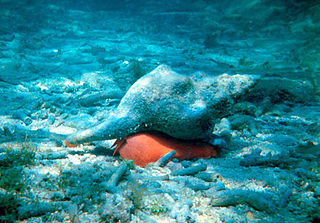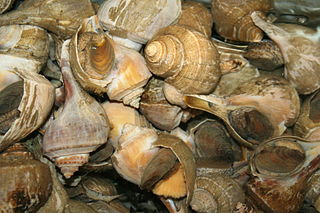
Whelk is a common name applied to various kinds of sea snail. Although a number of whelks are relatively large and are in the family Buccinidae, the word whelk is also applied to some other marine gastropod species within several families of sea snails that are not very closely related.

Triplofusus giganteus, previously known as Pleuroploca gigantea, common name the Florida horse conch, is a species of extremely large predatory subtropical and tropical sea snail, a marine gastropod mollusc in the family Fasciolariidae, the spindle snails, tulip snails and their allies.

The knobbed whelk is a species of very large predatory sea snail, or in the US, a whelk, a marine gastropod mollusk in the family Busyconidae, the busycon whelks.

Busycotypus canaliculatus, commonly known as the channeled whelk, is a very large predatory sea snail, a marine prosobranch gastropod, a busycon whelk, belonging to the family Busyconidae.

Busycon is a genus of very large edible sea snails in the subfamily Busyconinae. These snails are commonly known in the United States as whelks or Busycon whelks. Less commonly they are loosely, and somewhat misleadingly, called "conchs".

Dakshinavarti shankha, also referred to as Valampuri shankhu and Sri Lakshmi shankha is a sacred Hindu conch. It refers to the shell of a large sea snail from the Indian Ocean, but one that has a rare reverse-turning spiral.

Rapana venosa, common name the veined rapa whelk or Asian rapa whelk, is a species of large predatory sea snail, a marine gastropod mollusc or whelk, in the family Muricidae, the rock shells.

Sea snail is a common name for slow-moving marine gastropod molluscs, usually with visible external shells, such as whelk or abalone. They share the taxonomic class Gastropoda with slugs, which are distinguished from snails primarily by the absence of a visible shell.

Sinistrofulgur perversum, the lightning whelk, is an edible species of very large predatory sea snail or whelk, a marine gastropod mollusc in the family Busyconidae, the busycon whelks. This species has a left-handed or sinistral shell. It eats mostly bivalves.

Busycotypus is a genus of very large sea snails, marine gastropod mollusks in the subfamily Busycotypinae.

Buccinum undatum, the common whelk or the waved buccinum, is a large, edible marine gastropod in the family Buccinidae, the "true whelks".
Fulguropsis feldmanni is a species of sea snail, a marine gastropod mollusk in the family Busyconidae, the crown conches and their allies.

Fulguropsis is a genus of sea snails, marine gastropod molluscs in the family Busyconidae, the crown conches and their allies.
Vermicularia spirata, common name the West Indian worm-shell or the West Indian wormsnail, is a species of sea snail, a marine gastropod mollusk in the family Turritellidae. Juveniles can move around, but larger individuals become sessile.

The thinstripe hermit crab, Clibanarius vittatus, is a species of hermit crab in the family Diogenidae. It is found in the Caribbean Sea, the Gulf of Mexico and the western Atlantic Ocean.

The Busyconinae are taxonomic subfamily of large sea snails, often known as whelks. The name "whelk" also refers to Buccinidae. Busyconinae consists of Recent and fossil species.

Sinistrofulgur is a genus of large sea snails with left-handed shell-coiling, marine gastropod mollusks in the subfamily Busyconinae.

Sinistrofulgur sinistrum is an edible species of large predatory sea snail in the family Busyconidae, the busycon whelks. This species is often confused with Sinistrofulgur perversum, and with Busycon contrarium, which is now considered an exclusively fossil species.

The Busyconidae are taxonomic family of large sea snails, often known as whelks.
Fulguropsis pyruloides is a species of Marine Gastropod, commonly known as the pear whelk. It is also known as the Florida pear whelk or Atlantic pear whelk in scientific and shelling circles to differentiate from the more well known Fulguropsis spirata, which is also known as the Pear Whelk. It was first described by American conchologist, Thomas Say, in 1822.
















